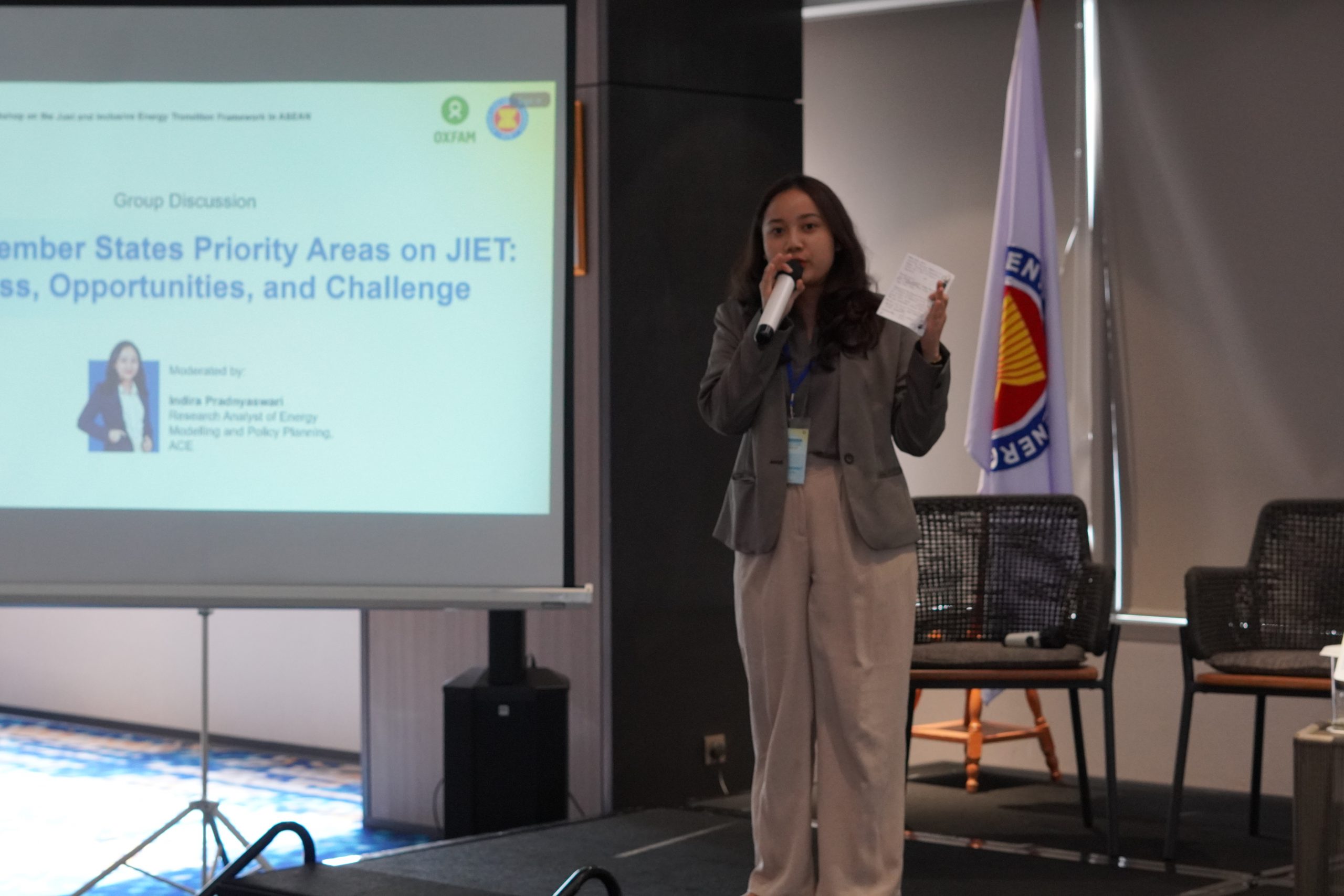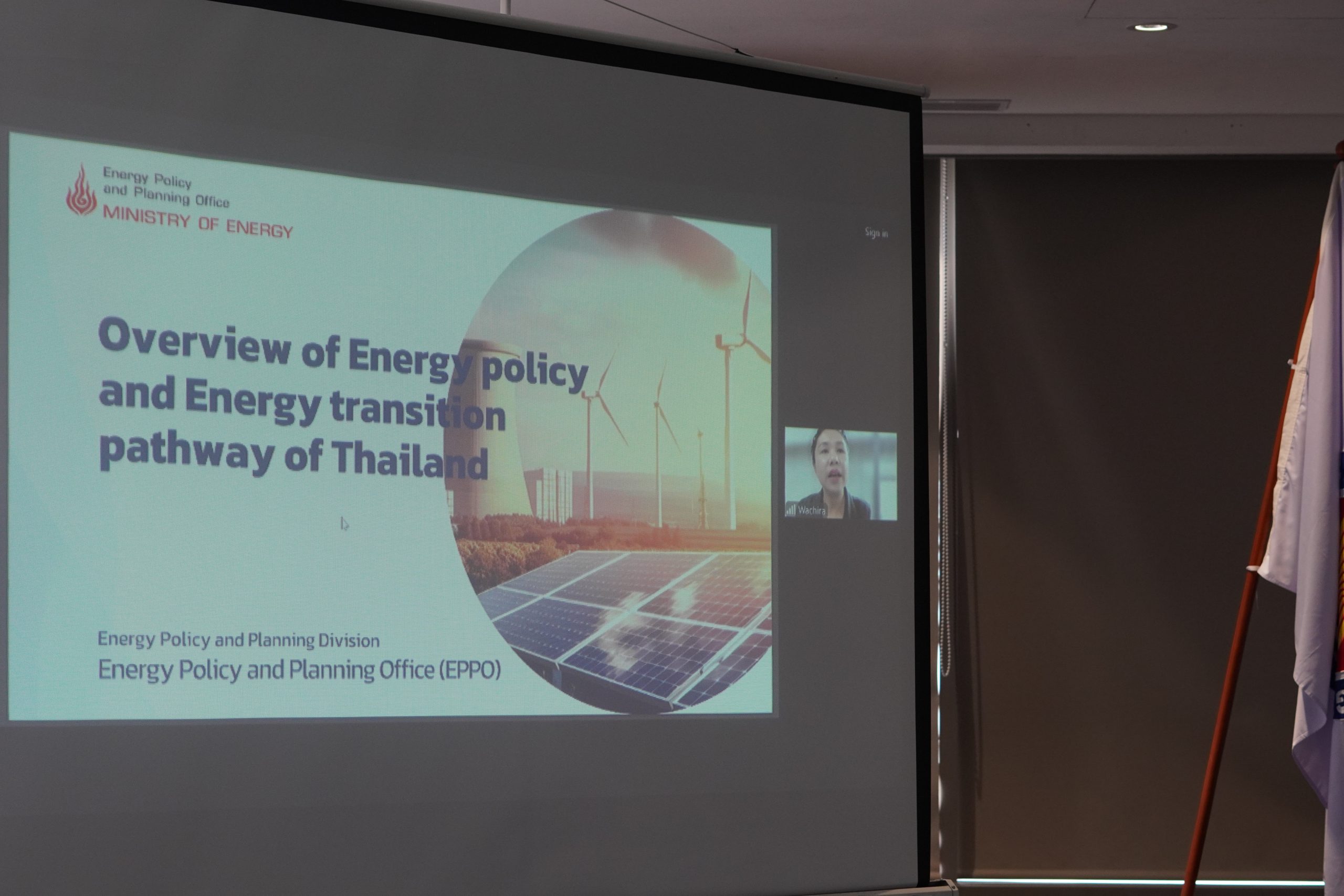Jakarta, 29 April 2025

Photo 1. Group photo of the Multistakeholder Consultation Workshop on the Just and Inclusive Energy Transition (JIET) Framework in ASEAN.
Jakarta, 29 April 2025 – On Tuesday, 29 April 2025, the ASEAN Climate Change and Energy Project (ACCEPT) participated in the Multistakeholder Consultation Workshop on the Just and Inclusive Energy Transition (JIET) Framework in ASEAN. Organised by the ASEAN Centre for Energy (ACE), this event convened regional stakeholders in ASEAN’s energy sector and underscored the region’s growing commitment to embedding Gender Equality, Disability, and Social Inclusion (GEDSI) into the energy transition narrative.
At the 42nd ASEAN Ministers on Energy Meeting (AMEM), energy ministers from all ASEAN Member States officially endorsed the theme for ASEAN Plan of Action for Energy Cooperation (APAEC) 2026-2030: ‘Advancing Regional Cooperation in Ensuring Energy Security and Accelerating Decarbonisation for a Just and Inclusive Energy Transition.’ This endorsement reflects the region’s collective commitment to strengthening collaboration in addressing energy transition challenges and promoting a just and inclusive transition. It also recognised the crucial role of extensive consultations with key stakeholders, including ASEAN Member States (AMS), Dialogue Partners (DPs), and International Organisations (IOs), to ensure that the next APAEC cycle reflects a broad spectrum of perspectives and priorities.

Photo 2. Panel Discussion on Gender Equality and Social Inclusion (GESI) in the Energy Transition featuring (from left to right) Aldilla Noor Rakhiemah, Project Manager of ACCEPT II, Alexandra Mutungi, Gender and Climate Change Expert of UNEP, Nachatira Thuraichamy, Senior Project Coordinator of IJET CANSEA, Lucky Nurrahmat, Country Lead Indonesia of Global Energy Alliance for People and Planet (GEAPP), Ratha Ra, Program Coordinator of Oxfam Cambodia, and Dia Mawesti, Project Manager of Oxfam Indonesia.
Aldilla Noor Rakhiemah, Project Manager of ACCEPT Phase II ) Phase II, and Indira Pradnyaswari, Research Analyst of ACCEPT II, took part in the discussions to talk about ASEAN’s energy-gender nexus.
One of the highlights of the workshop was the presentation session titled “GEDSI Progress in ASEAN Energy Transition,” delivered by Aldilla based on the recently published Gender Equality in ASEAN Energy – Volume II. In her address, Aldilla emphasised ACCEPT’s role in promoting GEDSI through capacity-building and cross-sectoral collaboration, including meaningful engagement with civil society organisations (CSOs).
Her presentation offered a snapshot of current progress of gender integration in ASEAN’s energy frameworks. While the region has made commendable strides—such as the formal embedding of Just and Inclusive Energy Transition goals into the upcoming APAEC 2026–2030—challenges remain. Aldilla noted that only 8% of the workforce in the energy sector comprises of women, underscoring the need for systemic change.
At the national level, AMS has also made strides in gender mainstreaming. While progress varies among AMS, the progress is encouraging. Challenges include data insufficiency, issue complexity, cultural and social norms, low job vacancies (especially in renewable energy sector), and financial constraints. The absence of an explicit mandate or binding regulation on the inclusion of gender equality in energy initiatives in a regional level is also one of the challenges that the AMS face. This presents the next cycle of APAEC with an opportunity to integrate gender perspectives into all energy initiatives. Gender considerations must be institutionalised beyond AMS through education and multistakeholder dialogue. A truly just and effective energy transition cannot be achieved without the meaningful inclusion of vulnerable groups.
Alongside the integration of gender considerations into policies within ASEAN, monitoring is important to see if the policies are applied accordingly. As of now, the monitoring is done per target areas to see if the target has been achieved. There is an opportunity to restructure our governance, using the energy transition to gain awareness and ensure that these communities are considered in the future.

Photo 3. Group Discussion on ASEAN Member States Priority Areas on JIET: Progress, Opportunities, and Challenges, moderated by Indira Pradnyaswari, Research Analyst of ACCEPT.
The workshop continued with a group discussion with a theme of, “ASEAN Member States Priority Areas on Just and Inclusive Energy Transition: Progress, Opportunities, and Challenges.” The discussions, moderated by Ms. Indira Pradnyaswari, were kickstarted with a presentation by Ms. Wachira from the Energy Policy and Planning Office of Thailand’s Ministry of Energy. She explained about the ministry’s national energy plan framework in the country’s road towards net zero. Not just the environment, but the plan also considers the aspects of economy and society that will also benefit from energy transition.

Photo 4. Wachira from Energy Policy and Planning Office of the Thailand’s Ministry of Energy presenting an overview on Thailand’s energy transition
After the presentation, the discussions among the participants are guided by several questions around the concept of JIET, what they think of it, and how do the experiences in their respective countries apply to the concept. During a discussion about education and capacity building required to achieve JIET, one participant expressed concerns about conditionalities that foreign firms bring when coming to ASEAN countries to invest. These conditionalities may come in forms of bringing foreign workers to man the companies and factories built for the investment, which may not be beneficial for the surrounding communities. The government, through law enforcement, can help mitigate these risks by protecting existing communities from being marginalised.
Policies are only as good as if they are implemented. When talking about the concept of just and inclusivity, gender and social inclusion become the focal points of the discussion. This includes looking at and listening to the stories of implementation at the ground level—how the policies and initiatives have impacted the communities.
Challenges are still found in the process of mainstreaming JIET, especially in the energy sector. Overlapping policies and initiatives often create confusion and hinder effective implementation. Moreover, the critical need for private sector participation in this process was mentioned, emphasising the need for profit-driven entities to find a balance between commercial interests and meaningful contributions to the JIET progress.

Photo 5. Participants taking part in the focus group discussion
Monitoring and evaluation (M&E) have crucial roles in ensuring that policies and initiatives effectively achieve their intended objectives. Key components of a strong M&E framework include the development of clear indicator checklists, transparency in reporting, and mechanisms for community feedback. As highlighted by one of the participants, it is essential for all stakeholders to convene and engage in dialogue prior to the M&E process, to ensure alignment, inclusivity, and shared understanding at every stage.
As we draw nearer to the next cycle of the APAEC, the concept of JIET is more important than ever. Energy transition should involve a holistic approach, not only considering the technical aspects of energy systems, but also addressing issues that affect and are affected by this phenomenon, which includes the social, economic, and political aspects. Community, at the heart of ASEAN, is central to energy transition. Incorporating the people’s needs into policies and initiative will be a leap in the region’s journey to a just and inclusive energy transition.
In continuation of this, ACCEPT II will consistently advocate for the progress of ASEAN’s just and inclusive energy transition through knowledge sharing and capacity building projects. Its activities will include a multistakeholder approach to ensure that no one is left behind in the pursuit of the region’s sustainable energy transition.
**
(LL, NA, HEPR)
Join our ASEAN Researchers Network on Climate Change (ARNECC) by registering yourself here. Become a part of our collaborative efforts to address pressing climate challenges and shape a sustainable future.
Detailed information on ACCEPT II can be found at https://accept.aseanenergy.org/
Follow our social media to get the latest updates on ACCEPT activities and ASEAN energy-climate information:
Instagram: instagram.com/asean_accept
X: x.com/asean_accept
We welcome any future collaboration, please feel free to contact us at [email protected]